APPENDIX A Basic Snacks Here is a list of snacks to incorporate into your daily routine while following the Mediterranean diet. These snacks do not require much preparation, and many can be purchased directly from the grocery store. SNACKS UNDER 50 CALORIES:
| 1 small apple, sliced small banana 1 cup blueberries cup fruit salad 14 grapes 1 sliced kiwi fruit 1 small orange 1 peach 1 cup chopped watermelon ounce sliced avocado 1 cup sliced celery | 1 sliced tomato with 1 tablespoon grated Parmesan cheese 1 dark chocolate square 3 cups air-popped popcorn 4 whole-grain crackers 1 tablespoon hummus with celery cup plain nonfat Greek yogurt mixed with 1 teaspoon honey 8 pitted kalamata olives ounce dried turkey jerky |
SNACKS UNDER 100 CALORIES:| 1 sliced apple with 2 teaspoons peanut butter 1 small baked apple with cinnamon 1 cup unsweetened applesauce 1 small banana 3 peeled clementines 3 tablespoons dried fruit 1 cup chopped pineapple 2 tablespoons hummus with 8 baby carrots 1 scoop nonfat frozen yogurt | 3 large carrots, peeled and sliced 1 cup tomato soup 3 dark chocolate squares 6 cups microwave popcorn 15 whole almonds 30 shelled pistachios cup whole-grain granola 2 tablespoons toasted chickpeas 2 tablespoons toasted pumpkin seeds 1 hard-boiled egg |
APPENDIX B Healthful Substitutions When following a new diet, it can take time to get used to new restrictions. The great thing about the Mediterranean diet is that it isnt focused on a prescribed calorie count, and the list of restrictions isnt a mile long. In order to succeed in your new diet, focus not on what you cant have but on what healthful alternatives you can enjoy. Here is a list of healthful substitutions for unhealthful foods that you can feel free to enjoy on the Mediterranean diet.
Substitute Greek yogurt for mayonnaise or sour cream to cut down on the fat and calories. Use unsweetened applesauce in place of oil and butter in your recipes for baked goodsthey will turn out moist and delicious. If you dont have any applesauce on hand, substitute an equal amount of mashed banana or avocado. Rather than eating bread with your meal and croutons on your salad, try substituting a tablespoon or two of nuts as a salad-topper. Use unbleached flour rather than all-purpose flour in your recipes. Unbleached flour does not go through chemical bleaching processes.
Rather than using skim milk in place of cream in thick soups, and as a result sacrificing texture, try substituting pured potato instead. Swap out your reduced-fat peanut butter for all-natural peanut butter. It doesnt contain all the artificial additives and still contains healthful fats. In several recipes you will see pitted dates as a key ingredient. Dates are a great substitute for sugar because they are naturally sweet. Avoid using butter in your recipes, especially when browning meats and sauting vegetables.
Use olive oil instead. If you are watching your cholesterol, substitute two egg whites for one whole egg in a recipe. Throw away your iceberg lettuce and opt for nutrient-rich greens such as kale, spinach, and romaine lettuce.  CHAPTER ONE What Is the Mediterranean Diet? Embracing the Mediterranean diet is all about making some simple but profound changes in the way you eat today, tomorrow, and for the rest of your life. Oldways Preservation Trust, Mediterranean Diet 101 As stated in the introduction, there is no one Mediterranean diet. That is to say that all the countries bordering the Mediterranean Sea have their own unique cuisines and delicacies. Most Mediterranean cultures, however, follow similar dietary principles and habits, which is what the modern Mediterranean diet is based on.
CHAPTER ONE What Is the Mediterranean Diet? Embracing the Mediterranean diet is all about making some simple but profound changes in the way you eat today, tomorrow, and for the rest of your life. Oldways Preservation Trust, Mediterranean Diet 101 As stated in the introduction, there is no one Mediterranean diet. That is to say that all the countries bordering the Mediterranean Sea have their own unique cuisines and delicacies. Most Mediterranean cultures, however, follow similar dietary principles and habits, which is what the modern Mediterranean diet is based on.
Before you can make the switch to the Mediterranean diet, you need to understand the basics: What are the benefits of this diet? Is it possible to lose weight on the Mediterranean diet? And which foods should be included and avoided on the diet? There are many different diet plans available to choose from, and you might be overwhelmed by the sheer number of choices. The Mediterranean diet is just one of those choices, but you will soon see why it is superior to many other options. In this chapter you will learn everything you need to know in order to make an educated decision regarding whether the Mediterranean diet is the right choice for you. If it is, you can move on to the second chapter of this book, in which you will learn how to effectively utilize the tools and meal plans included in this book. Your journey in weight loss and health transformation begins here, so dont be afraid to jump right in. BENEFITS OF THE DIET In 2012, the American Heart Association (AHA) published an assessment of the Mediterranean diet and how well it adheres to the AHAs standards for heart-healthy eating.
The AHA found that the average Mediterranean diet is lower in saturated fat than the traditional American dietin fact, the average consumption rate of saturated fat in Mediterranean cultures is well within the AHA dietary guidelines. Though the Mediterranean diet is high in dietary fat, more than half of the fat calories consumed in the Mediterranean diet come from monounsaturated fat. Monounsaturated fat, which comes from sources like olive oil and avocados, has a lesser effect on blood cholesterol levels than saturated fat, which comes from animal products such as meat, eggs, and dairy. The AHA also found that death rates and the incidence of heart disease were lower in Mediterranean countries, although the more active lifestyle of many Mediterranean cultures compared with the average American activity level is considered to be a significant factor in this statistic. Though improved heart health and reduced risk for heart disease are two of the main benefits of the Mediterranean diet, they are not the only benefits. In the years following World War II, Dr.
Ancel Keys, a Minnesota physiologist, helped pilot a study on the effects of the Mediterranean diet on overall health. This study involved more than twelve thousand middle-aged men from seven different countries, thus earning it the name the Seven Countries Study (Keys, 1966). The countries represented in this study include the United States, Italy, Japan, Greece, Finland, Yugoslavia, and the Netherlands. The study began in 1958, and the results were published in book form by Harvard University Press in 1980. The main focus of the study was to determine the preventability of heart disease and the effects of saturated fat consumption on heart health, but the results were just the tip of the iceberg in scientific research regarding the Mediterranean diet (Keys, 1966). Following the findings of the Seven Countries Study, many other studies were conducted regarding the various health benefits of the Mediterranean diet.
A study published in the British Medical Journal in 2008, for example, revealed that adherence to a Mediterranean diet was associated with a 9 percent reduction in overall mortality in test subjects as well as a 13 percent reduction in risk for neurodegenerative diseases such as Alzheimers and Parkinsons disease (Sofi et al., 2008). In 2009, a study was published in the Journal of Nutrition regarding the effect of the Mediterranean diet on the risk for chronic disease. The results of this study suggest that an eating pattern high in plant foods and unsaturated fats, like the Mediterranean diet, can reduce the risk for lower abdominal obesity and coronary heart disease (Romaguera et al., 2009).  Combined with regular exercise and not smoking, the Mediterranean diet can greatly reduce your risk for chronic disease.
Combined with regular exercise and not smoking, the Mediterranean diet can greatly reduce your risk for chronic disease.
Next page
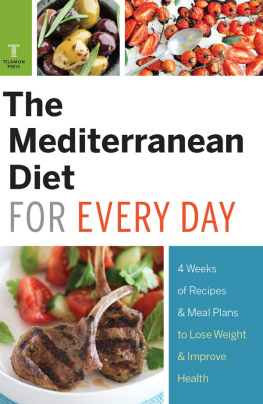


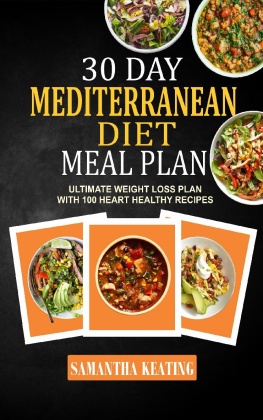

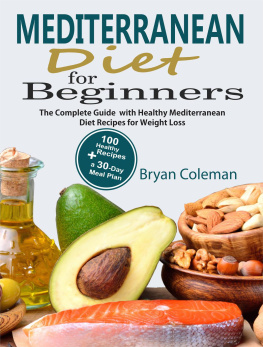
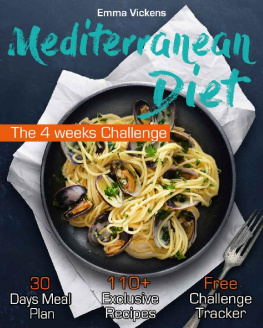
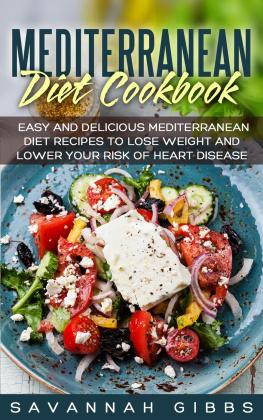

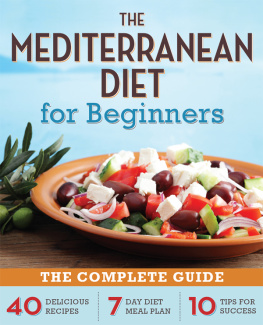

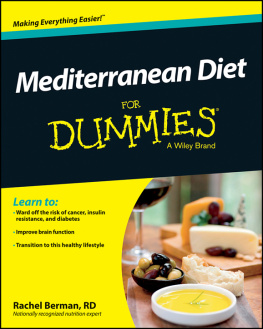
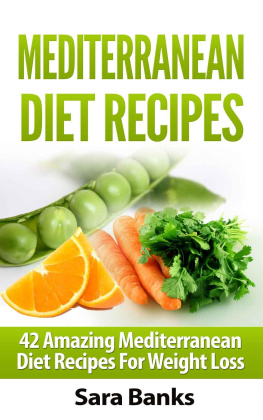
 CHAPTER ONE What Is the Mediterranean Diet? Embracing the Mediterranean diet is all about making some simple but profound changes in the way you eat today, tomorrow, and for the rest of your life. Oldways Preservation Trust, Mediterranean Diet 101 As stated in the introduction, there is no one Mediterranean diet. That is to say that all the countries bordering the Mediterranean Sea have their own unique cuisines and delicacies. Most Mediterranean cultures, however, follow similar dietary principles and habits, which is what the modern Mediterranean diet is based on.
CHAPTER ONE What Is the Mediterranean Diet? Embracing the Mediterranean diet is all about making some simple but profound changes in the way you eat today, tomorrow, and for the rest of your life. Oldways Preservation Trust, Mediterranean Diet 101 As stated in the introduction, there is no one Mediterranean diet. That is to say that all the countries bordering the Mediterranean Sea have their own unique cuisines and delicacies. Most Mediterranean cultures, however, follow similar dietary principles and habits, which is what the modern Mediterranean diet is based on. Combined with regular exercise and not smoking, the Mediterranean diet can greatly reduce your risk for chronic disease.
Combined with regular exercise and not smoking, the Mediterranean diet can greatly reduce your risk for chronic disease.